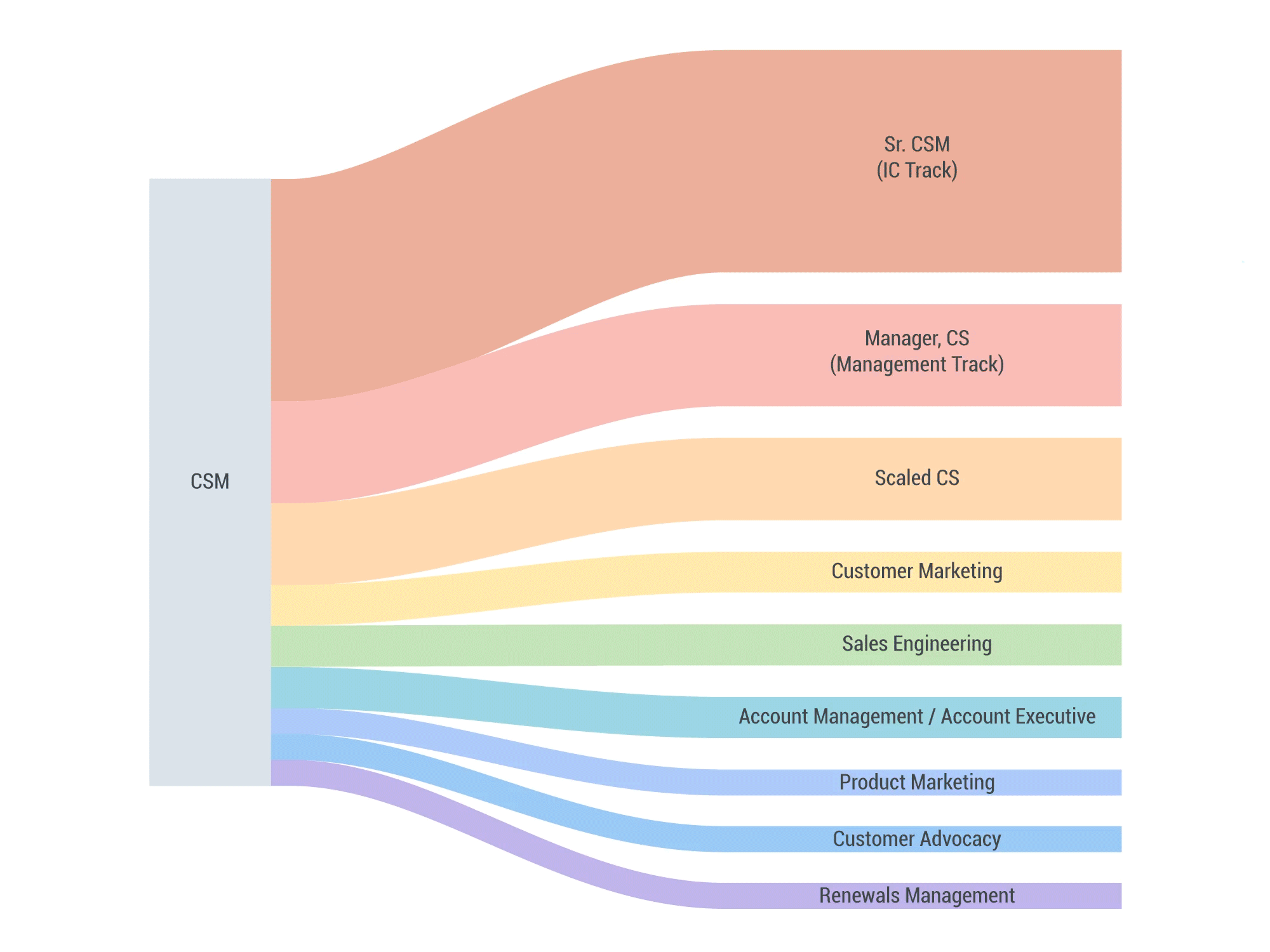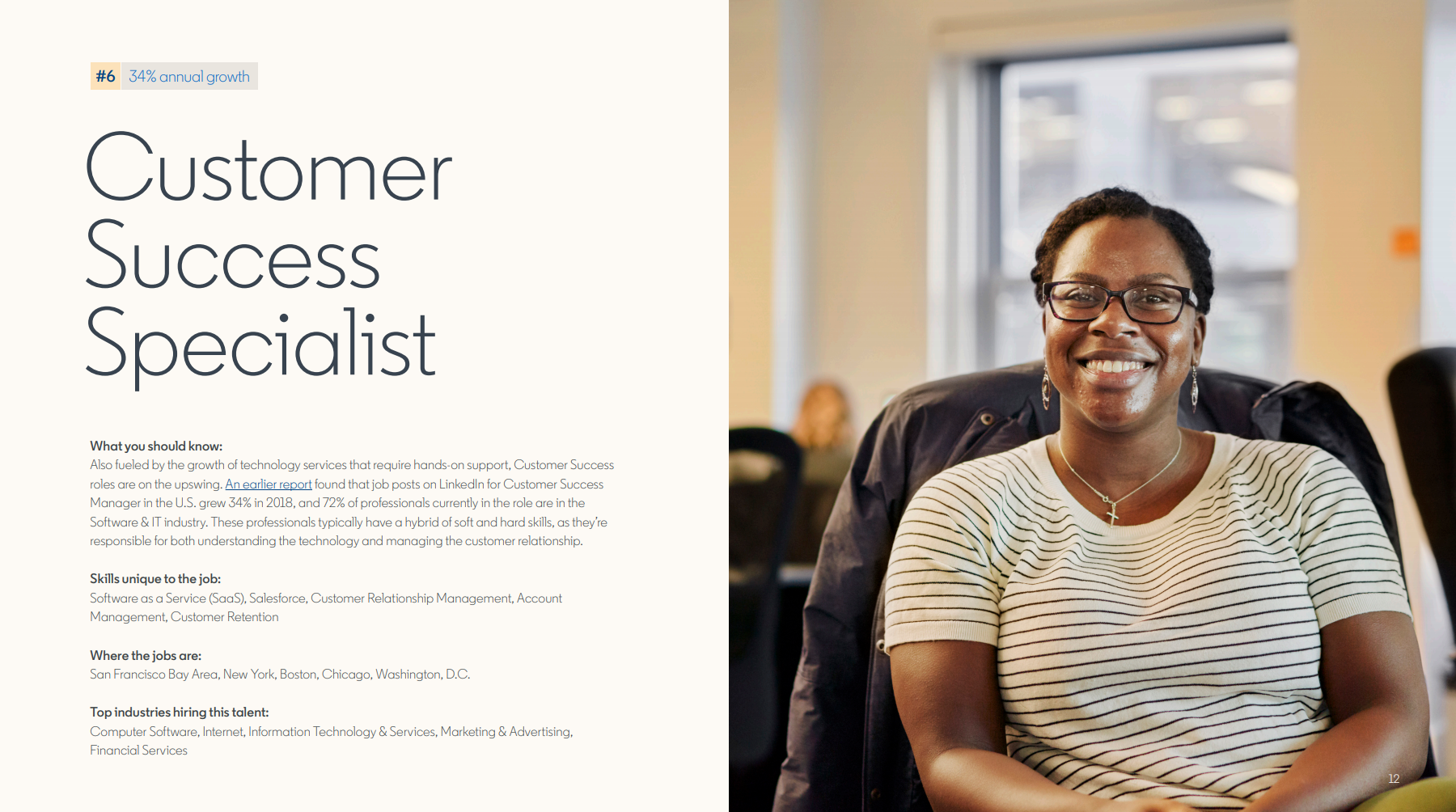Customer Success Career Paths
Customer Success is having a moment in 2020.
The growth in Customer Success has been substantiated in a number of ways.
On a macro level, public SaaS companies have seen phenomenal growth in the last decade. Bessemer Venture Partners (BVP) tracks the performance of public SaaS companies through their Emerging Cloud Index.
Want to guess how much growth that index has seen since 2013?
The BVP Emerging Cloud Index has gained 982% since 2013. Compare that to the broader NASDAQ at 245% and the S&P500 at 123%.
Investors see the value in SaaS and dollars are flooding into public SaaS companies.
On a more granular level, one of the grandfathers of Customer Success, Gainsight, was just acquired for $1bn+.
And with this rise in subscription software, roles in Customer Success have grown in volume and prominence. Just this year Linkedin named Customer Success Specialist as one of the top emerging growth roles in 2020 showing 34% annual growth in job listings.
If you’ve decided to pursue a career in Customer Success, first, congratulations, it’s an incredibly rewarding career path. The growth opportunity and community in Customer Success is second to none.
But you may be thinking… after taking that Customer Success Manager role — what’s next? Where can I go as a CSM in my career?
That’s what we’re answering today on CSFG.
Hundreds of interviews with CS professionals over the last 10 years have given us an understanding of the most common career paths following someone’s first Customer Success Manager role.
Let’s dive in.
Customer Success Track (IC + Management)
Given the recognition of Customer Success over the last decade, more than 50% of CSMs pursue a career within Customer Success itself. It’s one of the fastest growing and most prominent roles in software today. CSMs typically follow three primary paths within Customer Success:
Individual Contributor (IC): This path focuses on diving deeper into the Customer Success Manager role. This usually means going ‘up-market’ to work with larger and more strategic customers. A CSM on this path can continue to refine their CS approach and up-level the types of conversations they’re having from a more transactional SMB model into a strategic consultant with enterprise executives. If you’re passionate about advising on this level and adding depth to your customer-facing work, this is the natural progression in your path as a CSM.
Management: For those seeking people management in their career, this path means stepping into a team-lead or managerial role. It’s filled with career development talks, coaching, performance management, compensation, hiring, firing, OKRs, MBOs, and metrics. It’s still in Customer Success, but should be recognized as having a fundamentally different focus than that of a CSM. Some CS Managers spend time in the field, attending customer meetings with CSMs, but the extend of that exposure depends on the CS organization. If working face-to-face with customers is rewarding for you, consider how this might change if you step into a management role.
Scaled CS: As companies grow their customer base and a higher proportion of revenue is coming from existing renewal and expansion, CS leaders will always be looking for ways to scale their efforts. Possible positions in support of these goals include: Scale CSM, tech-touch lead, program manager, customer lifecycle manager, or a CX manager. The key is that all of these focus on how you take that white-glove CSM experience and scale it to the broader customer base. This path is naturally suited for those that love data, operations, and have a scale mindset. If you find yourself asking yourself, “But will that scale?”, or having a passion for adding value beyond your immediate portfolio, this path could be for you.
Customer Marketing
If Customer Success is batman, then Customer Marketing is Robin.
These two pair together to influence customer behavior at scale through marketing-orientated strategies. Those include: Email Campaigns, Webinars, Videos, and Community. This path is for CSMs who enjoy creating content, and communicating with customers at scale. Many CSMs have had wildly successful Customer Marketing careers, as they understand what customers need, and how to communicate with the most impact. Better yet, Customer Marketing’s key constituent is the Customer Success team, so you’ll stay closely connected to your former teammates.
Sales Engineering
Sales Engineering is a role that is all about positioning of value.
CSMs can be excellent Sales Engineers because they’ve seen what it takes for a customer to be successful in the long-term. With an eye for recognizing specific business challenges and marrying them with your product’s solutions, CSMs can be great SEs. For those that are naturally drawn toward product capabilities and have a technical bent, Sales Engineering is a fantastic path. And because you’ll have experience knowing what a successful customer looks like as a CSM, you will be well positioned to add value as a bridge between pre and post-sales teams. Sales Engineering typically also comes with a more leveraged compensation plan, so if you’re the kind of person that likes being able to significantly impact your own paycheck based on your performance, this role could be for you.
Sales
Sales is also in the category of positioning value, but with a commercially orientated lens.
Like Sales Engineering, this path moves CSMs further upstream into the pre-sales motion, with a leveraged compensation plan. As a reminder, this means a higher portion of your OTE comes from variable as opposed to base pay. If you’re drawn to account mapping, relationship management, and positioning value to net-new departments, sales could be a natural extension of the work you’re already doing with existing customers. Added bonus if you enjoy contract structures and negotiations. Something to keep in mind is that although the leveraged compensation model allows for a bigger opportunity to exceed OTE, it comes with added risk for under performance. This role is great for motivated and hungry self-starters.
Product Marketing
Product Marketing is a natural extension of Customer Success.
A large portion of the CS role is to position the value of new features to customers. This is what Product Marketing does day-in and day-out. Product marketing is the process of bringing a product to market. And the process of marketing a product lasts well after its launch to ensure the right users are aware of the product, those users know how to use it, and that the needs and feedback of those users are being listened to over the product's lifecycle. A move into the Product Marketing department moves you closer to the product team, while allowing you to partner with your old friends in Customer Success. In this role, you’ll be doing broader market research, partnering with Sales, Customer Success, Product, and Marketing. It’s a highly cross-functional and typically internally-facing role, but given CSMs innate ability to build relationships and position value to customers, they can be excellent Product Marketers.
Customer Advocacy
Creating a family of advocates is central to the customer success role and builds the Second Order Revenue that Jason Lemkin says is so important for high-growth SaaS companies.
For CSMs that love gathering value stories, case studies, and running webinars with customers, these are all motions that fit nicely into a Customer Advocacy role. CSMs are fantastic Customer Advocacy Managers, because they’ve already worked directly with customers and likely already have a MBO or OKR centered around advocacy. And, if you’re interested in customer advocacy, but your company doesn’t have a customer advocacy role, consider making a business case for this department! References, case studies, value stories, one-pagers, and customer speaking engagements are critical to both Sales and Customer Success, so you’ll be partnering with pre and post sales teams. Again, a highly collaborative internally-facing role.
Renewals Management:
Renewals Management is the function that sits at the center of all customer renewals.
It’s processing, negotiating, and closing customer renewals, the lifeblood of a SaaS company. The focus of this team is to ensure customer renewals come in on time, with the primary goal being 100% GRR for customers up for renewal. If you’re a CSM that loves the renewal negotiation process, you love working with sales ops, and you love having a very quantifiable role based on performance metrics, Renewals Management could be for you. CSMs that are interested in the commercial aspect of the customer relationship, but aren’t quite ready to take the leap into sales could find a happy medium in Renewals Management.
After years of research, these are the most common pathways after your first CSM role. If there’s a role you feel should be added to the list, we’d love to hear from you:
https://www.customersuccessfieldguide.com/contact
✌️




